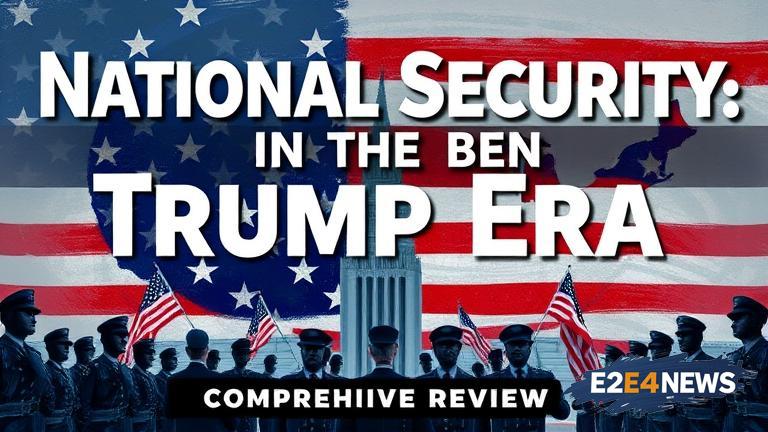The national security landscape has undergone significant changes since the Trump administration took office. Recently, a WA Congressman addressed the topic, providing insight into the current state of national security and the challenges that lie ahead. The Congressman emphasized the importance of a strong and effective national security strategy, citing the need for a comprehensive approach that addresses both domestic and international threats. The Trump era has been marked by a number of significant national security concerns, including the rise of terrorism, cyber threats, and nuclear proliferation. The Congressman noted that the current administration’s approach to national security has been characterized by a mix of both successes and failures. One of the key challenges facing the US is the ongoing threat posed by terrorist organizations such as ISIS and Al-Qaeda. The Congressman emphasized the need for a sustained and coordinated effort to combat these threats, including increased cooperation with international partners and a focus on counter-terrorism strategies. The rise of cyber threats has also become a major concern, with the Congressman highlighting the need for increased investment in cybersecurity measures and improved cooperation between government agencies and private sector entities. The issue of nuclear proliferation has also been a major concern, with the Congressman noting that the current administration’s approach to North Korea has been marked by a mix of both diplomacy and aggression. The Congressman emphasized the need for a peaceful resolution to the crisis, citing the devastating consequences of a potential nuclear conflict. The WA Congressman also discussed the importance of maintaining a strong and effective military, citing the need for increased investment in defense spending and improved cooperation between different branches of the military. The Congressman noted that the current administration’s approach to national security has been marked by a number of controversies, including the travel ban and the separation of migrant families at the border. The Congressman emphasized the need for a more nuanced and effective approach to immigration policy, citing the importance of balancing national security concerns with humanitarian considerations. The issue of Russian interference in US elections has also been a major concern, with the Congressman highlighting the need for increased cooperation between government agencies and improved measures to prevent future interference. The Congressman noted that the current administration’s approach to national security has been marked by a number of significant challenges, including the need to balance competing priorities and navigate complex geopolitical relationships. The Congressman emphasized the importance of a strong and effective national security strategy, citing the need for a comprehensive approach that addresses both domestic and international threats. The WA Congressman concluded by emphasizing the need for bipartisan cooperation and a commitment to putting national security interests above partisan politics. The national security landscape is likely to continue evolving in the coming years, with a number of significant challenges and opportunities on the horizon. The Congressman noted that the US must be prepared to adapt to changing circumstances and prioritize national security interests above all else. The issue of national security is complex and multifaceted, requiring a comprehensive and nuanced approach that takes into account a wide range of factors and considerations. The WA Congressman’s comments provide a valuable insight into the current state of national security and the challenges that lie ahead, highlighting the need for a strong and effective national security strategy and a commitment to bipartisan cooperation. The national security concerns and challenges faced by the US are significant and far-reaching, requiring a sustained and coordinated effort to address. The WA Congressman’s discussion of national security in the Trump era provides a timely and important reminder of the need for a comprehensive and effective approach to national security, one that prioritizes both domestic and international threats and seeks to balance competing priorities and interests. The US must be prepared to navigate complex geopolitical relationships and adapt to changing circumstances, all while prioritizing national security interests above all else. The WA Congressman’s comments highlight the importance of a strong and effective national security strategy, one that is guided by a commitment to bipartisan cooperation and a focus on putting national security interests above partisan politics. The national security landscape is likely to continue evolving in the coming years, with a number of significant challenges and opportunities on the horizon. The US must be prepared to meet these challenges head-on, prioritizing national security interests and seeking to balance competing priorities and interests. The WA Congressman’s discussion of national security in the Trump era provides a valuable insight into the current state of national security and the challenges that lie ahead, highlighting the need for a comprehensive and effective approach to national security.
